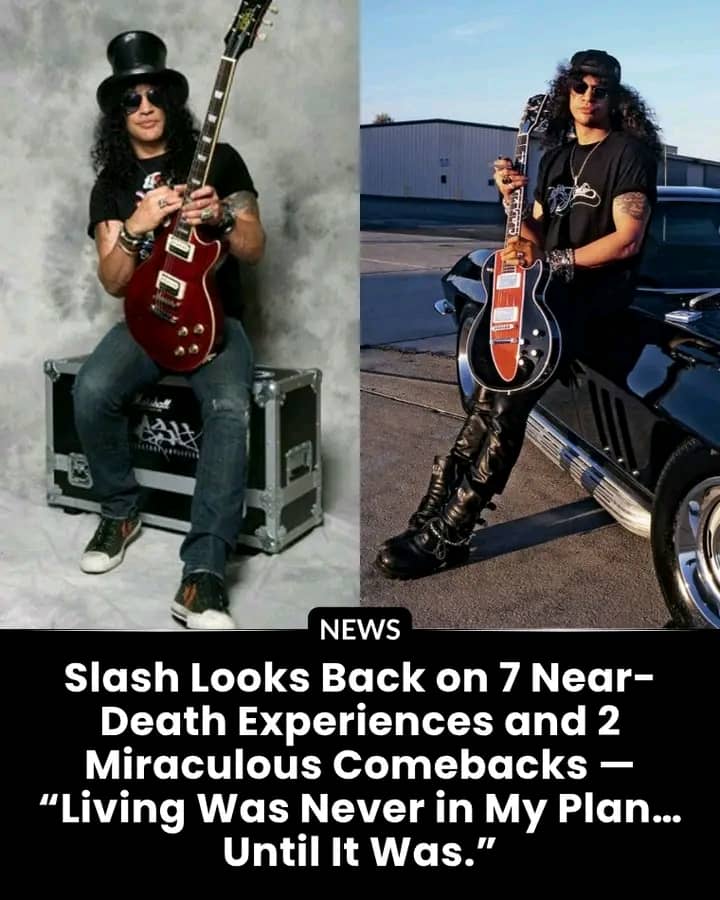
Once upon a time, Slash — the top-hatted, cigarette-dangling, Les Paul-slinging icon of rock and roll — believed he wouldn’t make it past 30. That belief wasn’t just morbid fantasy. It was a calculated conclusion based on the lifestyle he was leading: a daily cocktail of drugs, chaos, and a tour bus barreling through life with no brakes. “Living was never in my plan… until it was,” he admits now, decades removed from the abyss he used to call home.
Now, at 60, the man born Saul Hudson is doing the unthinkable: thriving. Still filling arenas, still shredding with the fury of a man half his age, Slash isn’t just surviving — he’s rewriting what it means to be a rock god in a world that’s buried far too many of its legends.
And to truly appreciate the gravity of his evolution, you have to understand the depth of the darkness he clawed his way out of.
The Near-Death Chronicles
Slash doesn’t toss around the term “near-death” lightly. Over the years, he’s racked up at least seven close calls — most of which could’ve, and maybe should’ve, ended in an obituary. A heart stopped cold from a heroin overdose. Another time, a bout of pneumonia left him with only 25% of his heart function. Then there were seizures, crashes, falls, and nights he doesn’t even remember — the kind of invisible Russian roulette that leaves even the strongest bodies broken and the brightest stars dimmed.
“I remember lying in a hospital bed, wired up, thinking: Well, this is it,” he says of one overdose in the mid-90s that left him clinically dead for several minutes before being resuscitated. “They told me I flatlined. I just shrugged. That’s how numb I was.”
The Myth of the Doomed Rock Star
In the lore of rock and roll, dying young has always been romanticized. Hendrix, Joplin, Morrison, Cobain — they didn’t just die; they became immortal. Slash knew that story by heart. In fact, for a while, he aspired to it.
“You think, I’ll burn bright and leave a beautiful corpse. That’s the myth, right? It’s bullshit. But when you’re inside the madness, it makes sense.”
For Slash, the stage was his church, the guitar his gospel — but the rest? A blur of needles, bottles, and wreckage. Guns N’ Roses, at their peak, were unstoppable — but offstage, they were imploding. Slash was spiraling. Friends and fans watched him deteriorate, expecting the inevitable headline.
But it never came.
The Moment That Changed Everything
Ironically, it wasn’t death that woke Slash up. It was life. Specifically, the slow and painful process of losing everything that mattered to him — band mates, marriages, his own sense of self.
“I looked around one day and realized I had no one left. I was alive, but I wasn’t living.”
It was a private moment, not some dramatic rehab epiphany, that cracked the shell. He got clean in 2006, after years of relapsing, lying, and pretending. He didn’t announce it. He didn’t Instagram a 90-day chip. He just started rebuilding. One honest day at a time.
He reconnected with his family. He dove into his solo career. And he began treating the body he once abused like a vessel he might actually want to keep around for a while.
The Addiction That Replaced the Others
These days, Slash is addicted to something far more radical than heroin: being alive.
“It sounds cheesy, but I wake up and I’m like, Holy shit, I get another day? That’s a high I never expected.”
He still tours constantly. Still writes. Still brings that unmistakable snarl of blues-soaked riffs that defined a generation. But there’s a gratitude in his tone now — a quiet rebellion against the nihilism that once defined him.
He doesn’t preach sobriety. He doesn’t wag fingers. “I’m not anyone’s guru,” he says. “I just know what worked for me — and what almost killed me.”
The Legacy He Never Planned To Have
In an age where rock stars are as likely to launch tequila brands as they are to die from them, Slash stands apart. He’s a relic — and a reinvention.
Once the epitome of reckless cool, he’s now a walking, riffing contradiction: a man who swore he wouldn’t live long enough to grow old, now proving that aging doesn’t have to mean fading. If anything, he’s more vital than ever.
And the fans? They’ve stuck with him. Not because he’s perfect, but because he’s real. Because he came through the fire and still plays like his soul is on the line.
Final Notes from the Edge
When asked what kept him alive — what miracle or twist of fate pulled him back those seven times — Slash doesn’t pretend to know.
“Some of it’s luck. Some of it’s stubbornness. And maybe there’s something bigger. I don’t know. But I know I’m not wasting it.”
He pauses, fingers idly mimicking a solo in the air. “There’s a part of me that still wants to disappear into the music forever. But now, I also want to wake up tomorrow. That’s new.”
It’s easy to mythologize the rock stars who die young. But maybe the real legends are the ones who don’t. The ones who survive — not just the lifestyle, but themselves. The ones who come back from the brink not with scars, but with stories.
Slash, against all odds, is one of them.
And every time he steps onstage, guitar in hand, grin wide under that signature hat, he reminds us: Living might just be the
wildest act of rebellion of all.

Leave a Reply